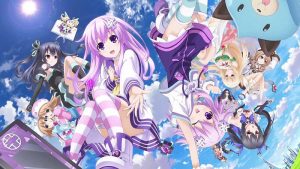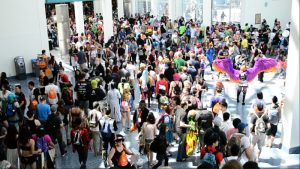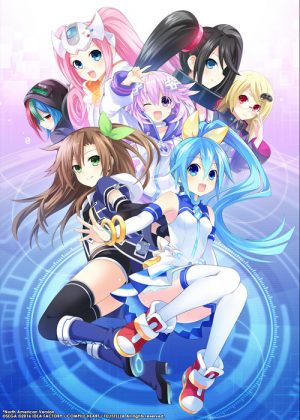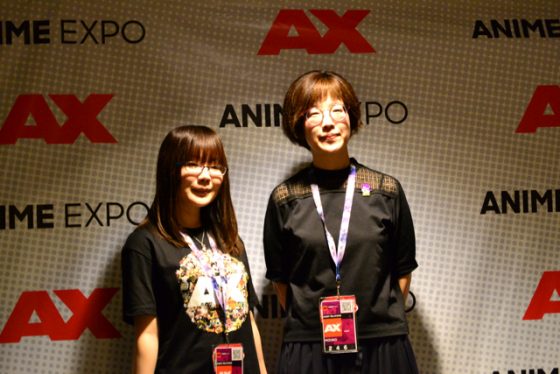
While at Anime Expo 2017, we got the chance to attend several panels with industry professionals. Some of those professionals were the two lovely ladies behind Idea Factory’s Hyperdimension Neptunia series! Tsunako, the series’ illustrator, and Mizuno, the producer, sat down with press and answered all our burning questions. Here’s what they had to share!
Q1. What has the journey been like seeing this small project become this grandiose thing that so many love?
Mizuno: It takes a lot of people to make games, but also, if we don’t have fans, we can’t create any games. So we feel very grateful of all the fans, thank you!
And also, when we created Neptunia, there are a lot of characters that are involved, and also many companies that helped to creating those characters, so we appreciate that as well.
Tsunako: I have exactly the same opinion as Miss Mizuno. We can’t make games or animation alone, many companies and fans also contributed in creating this Neptunia. I also wanted to let you know that my first job, when I first entered this company, was Neptunia! And I’m so surprised that I’m still doing that right now!
Q2. As an illustrator, which character do you never get bored of drawing?
Tsunako: It has to be Neptune. Because even though there is small Neptune and there is Purple Heart, and they’re technically two separate characters, they’re both the same character together. So, even though it’s Neptune, I’m able to draw her in different outfits and with different expressions, and so really, I can’t get tired of it at all.
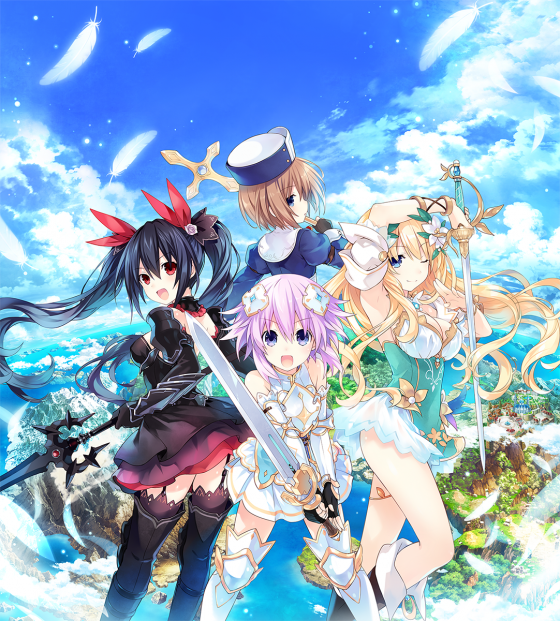
Q3. Which is the most difficult character for you to draw?
Tsunako: I find it very difficult to draw robot parts and robot characters, and since Neptunia characters always have big equipment, it’s difficult to draw, but I have to. So, any character that has lots of robot parts is difficult to draw.
Q4. How do you come up with the designs for characters with the companies they represent?
Mizuno: We have different ways of collaborating, but we tend to go to a company and ask ‘Would you like to participate in Neptunia?’. And this is quite challenging because we have to represent those companies and that’s a lot of responsibility. But what happens is that, usually, someone from our staff will be a fan of the companies and they are the ones to approach the companies. And the companies think that if they create a character for Neptunia, it would really fit in their animation. And that’s how we approach them and create the companies’ characters.
We also think about whether if they [the companies] created the characters, would that be good PR for the companies. So we think about that kind of thing.
Q5. Many creative professionals find this love for what they do at a very young age and are lucky enough to do it every day. Was that the case for you? Or did it come later in life?
Mizuno: Well, I’ve always played with computers and I always liked anime and manga, and I also liked doing illustration at a young age. But then at the age of 10, I encountered this love-of-my-life game and I decided I was going to be a graphic artist at a game company. So I did decide at a young age. The game was PuyoPuyo. PuyoPop in North America].
Tsunako: It’s a very long story. I also loved to play with computers when I was very young, and my family was very much like that as well. So they used to buy a lot of hardware and software [consoles and games] and so I had a chance to play with all the latest software and hardware. I did feel that I wanted to become a person who creates games, but I couldn’t tell my parents. I went to high school and college and then I graduated. And then I started working at a tofu shop and I became an office person at the tofu company. But after working there for two and a half years, I thought to myself ‘I really want to make games!’. I had a little bit of savings and so I went to a school that taught how to do 3D backgrounds, because that’s what I wanted to do at the time. And then, after I graduated, I started to work part time to make more money; and eventually, I started working as a part-timer collecting questionnaires at Idea Factory. And then I started appealing to my boss saying ‘I want to start creating games!’, and after 10 years of working there, finally, they said ‘Would you like to be a producer for Neptunia?’. And that’s how my story unfolded.
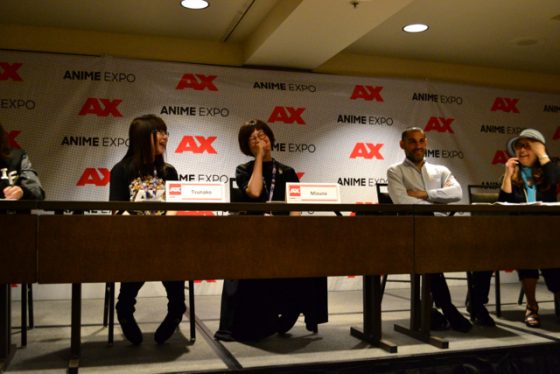
Q6. Is there something you’ve really been wanting to try in the Neptunia series that you can’t wait to get to do?
Mizuno: Well, in the endings of our games we have pixel characters in the art, so even just once, I’d like to make a game that has just pixel characters.
Tsunako: The game that I worked on when I first came on to Idea Factory was the Neverland series, which is a strategy game. But recently, we stopped making those kinds of games, so it would be neat to be able to do that with Neptunia and just have kind of a strategy Neptunia.
Q7. Do you have a final message for the fans?
Mizuno: Thank you so much. I am so honored to be participating in this kind of wonderful event. My parents are so happy that I’m participating. I’m so happy to meet all of the fans here and so this time around I really want to PR the Four Goddesses Online animation and hopefully everybody can get to know that!
Tsunako: I often watch Idea Factory’s Twitter feed and I love to see the comments and such. But I was also able to see the pictures from the events and stuff overseas, here. And to be able to actually come here and be able to see that myself is really amazing. I’m really looking forward to it, like Mizuno-san. I’m looking forward to meeting the fans and also promoting Four Goddesses Online, so thank you very much for having me!
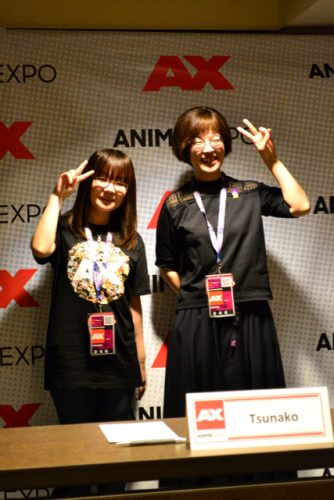
Final thoughts
A member of the overseas localization team at NIS Japan also joined the press conference and he spoke about the difficulties of adapting dialog in the game to other languages. For example, in order to clarify things like jokes or other phrases, the localization team is in daily communication with the Japanese team to find the equivalents in other languages so they can offer the best possible product in overseas. Interestingly, it was also mentioned that the overseas market that is the most like Japan in regards to the popularity of the Neptunia series is the US, with China following very closely. It seems that Japanese and US audiences have very similar tastes when it comes to games and anime, whereas Europe is very different.
It was certainly a treat to get to pick these talented artists’ brains and it was very interesting to hear about how our favorite games get brought to our side of the globe. And we hope that, like us here at Honey’s, you’re also really hoping for a dream-come-true pixel-art strategy Neptunia game! A girl can dream, right? ^_~
Stay tuned for more Q&A’s with this year’s AX guests!
Nya~!
Recommended Post
Top 10 Best Hyperdimension Neptunia Characters
Recommended Post
Top 10 Games by Idea Factory (!f) [Best Recommendations]
Recommended Post
Anime Expo 2017 - Post-Show Field Report
Recommended Post


